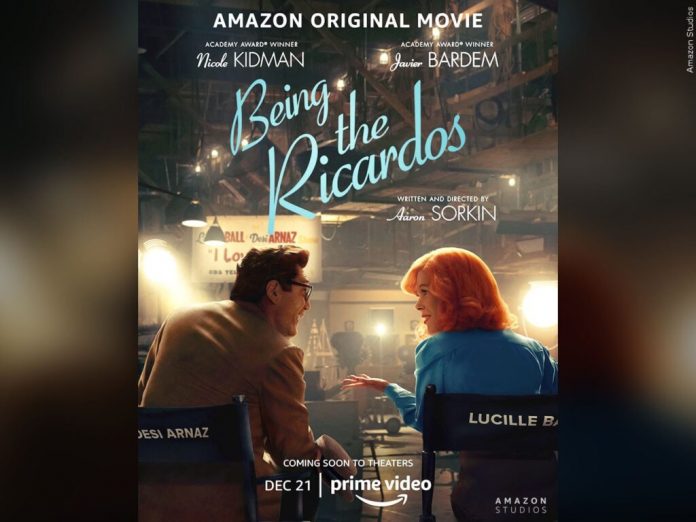At the peak of her popularity, the Lucille Ball-starrer TV show, I Love Lucy, had 60 million viewers, which gave her the freedom to overrule the director sometimes and allow her comic ideas free rein. She was one of the most powerful women in showbiz, but had to struggle every inch of the way to reach where she did.
She deserves a full-fledged biopic, but Aaron Sorkin’s Being The Ricardos, releasing in the year of the 70th anniversary of I Love Lucy, focuses mainly on one week (with a few flashbacks) in the lives of Lucille Ball and Desi Arnaz, that threatens to blow apart everything they so painstakingly built. In reality, all the crises did not occur in one week, but Sorkin has taken that dramatic liberty.
A columnist and radio host, Walter Winchell, insinuates that Lucille Ball (played by Nicole Kidman) is a communist, which, during the McCarthy and Hoover era and the House Un-American Activities Committee witch hunts, would mean an instant Hollywood blacklisting. However, Lucy is more worried about tabloid gossip exposing Desi Arnaz’s (Javier Bardem) womanizing ways. When she finds herself pregnant during her reign as TV’s comedy star, studio heads are aghast, because the word could not even be uttered on a family show. Desi tussles with the studio and sponsors, so that the sitcom character’s pregnancy mirrors Lucille’s; her childbirth and the infant are written into the storyline.
All-American Lucille and Cuban-born musician Desi had eloped at a time when interracial marriages were unthinkable. The initial years of their marriage were fraught with problems because of their clashing work schedules. At the age of 39, Lucille Ball is told by a creepy studio head that her contract has been cancelled. From radio she moves to television and insists that her on-screen husband be played by Desi (they proved that audiences would accept it by producing a stage show that became a hit, which is not in the film).
Sorkin has picked well-known episodes in their lives and also tried to capture how TV comedies were written, rehearsed and shot in the early days of television. The three writers of I Love Lucy, which, surprisingly for the times, included a woman, Madelyn Pugh (Alia Shawkat), come up with plotlines and comic sequences, but Lucille is seen as adding to the craziness of the scenes with her own gags. For some reason, Sorkin has used a mockumentary talking-head style of getting the older writers (played by actors) reminiscing about the show and its stars, so expository dialogue does away with the need to shoot some link scenes.
Lucy’s neighbours Fred (William Frawley played by JK Simmons) and Ethel (Vivian Vance played by Nina Adriana) become her anchors—the alcoholic Frawley a sort of sympathetic uncle (telling her that she must accommodate a Latino man’s ego!), and Vance, a slightly resentful (because she is portrayed as plain in the show), but otherwise supportive co-actor.
The beautifully shot film with its meticulous period look, is still a bit emotionally inert, perhaps because Lucille Ball and Desi Arnaz’s lives and careers had way more drama and it was all well-documented. Also, it is known that Lucille and Desi split a few years later, she went on to become a powerful studio head and produced many more shows and films (including more Lucy sitcoms, Star Trek and Mission Impossible); still Sorkin portrays her as an insecure woman. She must have fought a lot of her own battles, but Desi is seen as her knight, who pulls impossible stunts to save her career—like getting J. Edgar Hoover himself on the phone, giving his wife a clean chit, in front of a live audience. (In reality, there is just a clip of Desi saying, “The only thing that is red about Lucille is her hair, and that isn’t even real.”)
There has been much debate about the actors picked to play Lucille and Desi– and at one point Nicole Kidman was so rattled by the criticism that she wanted to back out of the film. Neither star resembles the people they are playing, but Bardem gets the charm, resilience and exuberance of the Cuban, Kidman is a bit shaky. Lucille Ball’s famous rubber face is almost impossible to emulate, and Kidman has no particular flair for physical comedy. She gets the husky voice right, though, and, well, full marks to her for courage.
What Being The Ricardos does perfectly—and nothing less could be expected of Aaron Sorkin– is bring a period alive for the viewer. In telling the story of a Hollywood power couple, he peppers the nostalgia with all that was ugly about showbiz, most of all, the sexism and racism.



